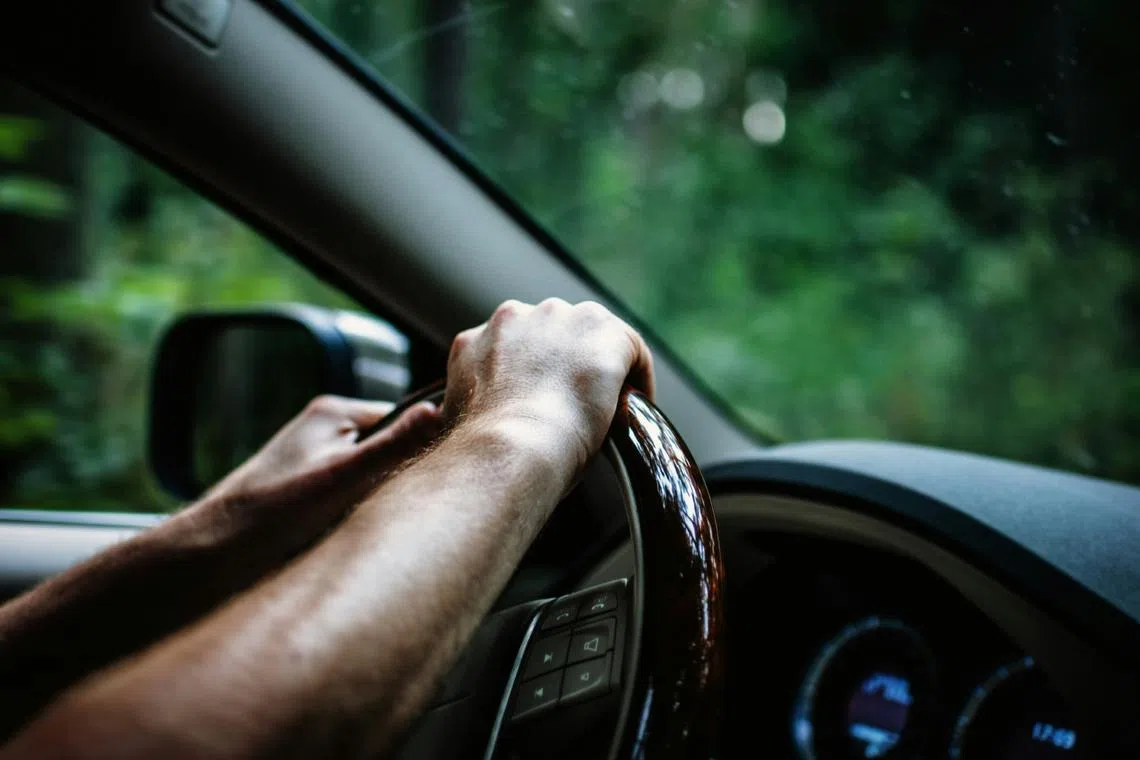askST: If I drink during CNY, can a friend drive me home in my car?
Sign up now: Get ST's newsletters delivered to your inbox

ST looks at who can be given the green light to legally drive your vehicle, and potential pitfalls behind the practice.
PHOTO: UNSPLASH
SINGAPORE - With all the dinners and get-togethers planned for the festive season, alcohol may well feature prominently.
As always, the ideal situation for car owners is not to drive if you are expecting to get tipsy – a reminder the Traffic Police issued ahead of the 15-day Chinese New Year period, which begins on Jan 29.
“If you plan to drink, do not drive. Instead, use public transport, book a taxi or ride-hailing service, engage the services of a valet, or designate a non-drinking driver to drive you home,” said the police.
“Remember, it’s not just about avoiding fines or demerit points – drink driving puts lives at risk, including your own. Let’s all do our part to keep Singapore’s roads safe during this festive period.”
But engaging a valet, or designating another driver to take you home in your own vehicle, is not as straightforward as it looks.
Not all insurance policies are equal and The Straits Times looks at who can be given the green light to legally drive your vehicle, and potential pitfalls behind the practice.
1. If I drink at a gathering, can a friend or a family member drive me home in my car?
In short, yes.
“However, it is important to ensure that the particular friend/family member has a valid driving licence that covers that class of vehicle,” said Mr Bryan Lim, associate director of Hoh Law Corporation.
That means making sure your friend or relative has a valid Class 3 licence if you are passing them your car keys.
While they are not breaking any laws driving you home in your car, insurance coverage may be a different matter.
While all vehicles driven in Singapore must have a valid insurance policy covering death or injury to a third party, some insurance policies restrict coverage to individuals specified in the policy.
So if your insurance policy is a named-driver policy, the insurance company must be notified of the identity of that particular friend or family member beforehand – which could make it an impractical proposition for a night out.
But if you have an authorised-driver policy, that usually means any person holding a valid and relevant class of driving licence can drive your car with your permission.
On that note, even if you authorise someone to drive your car, some policies have age and driving experience requirements to qualify for coverage, a General Insurance Association of Singapore (GIA) spokesperson told ST. So be clear on what your policy specifies.
2. If I am not using my car during the Chinese New Year period, can I lend it to a friend or family member?
The act of lending your car to another person is not an offence, said Mr Lim.
However, if the person driving your car uses it to commit an offence, then you may be liable, he added.
You are also breaking the law if you lend your car to someone who does not have a valid licence – including those suspended or disqualified from driving – or if your insurance policy does not cover other drivers, said the police.
These offences carry a fine of up to $10,000, a jail term of up to three years, or both. Repeat offenders are liable to a fine of up to $20,000, a jail term of up to six years, or both. The vehicle may also be forfeited.
The offence of using or permitting another person to use a motor vehicle without insurance coverage carries a fine of up to $1,000, or a jail term of up to three months, or both.
3. Are there risks involved in engaging valet services?
Vehicle owners should ensure that their motor insurance policy covers other drivers. Otherwise, they should not use any valet services unless they know that the valet company has its own insurance coverage, say lawyers ST spoke to.
The police advise car owners to review the service provider’s terms and conditions, particularly regarding liability, before using any valet service. Car owners should also ensure that the service provider employs licensed drivers and has proper insurance coverage, the police added, but they did not elaborate on what insurance coverage service providers should have.
Here is where it gets a little complicated, as it could be hard to check on details such as the insurance coverage of your valet – especially after a night of revelry.
Mr Patrick Yeo from Kennedys Law, which specialises in motor insurance, said that there is no legal requirement for valet services – including their employees and assigned drivers – to have insurance coverage in order to operate.
This means your valet driver could be serving you without any insurance coverage on their company’s end. Mr Yeo added that valet service providers may be able to “escape” liability if an accident happens. However, car owners could choose to pursue a civil suit against the providers in such instances.
4. So what should I look out for before engaging a valet?
Car owners should engage the services of valets that have motor trade insurance, said Mr Fu Wimala, CEO of Anika, a registered insurance broker.
“A motor trade insurance policy is always required whenever a business and its employees have care, custody and control of vehicles which are handed over to them. Such businesses would include car dealers, workshops, spray painters, towing companies, groomers and valet companies,” he said.
Mr Wimala also cautioned against using valets with only public liability insurances, which may not provide sufficient coverage.
“Public liability insurances cover members of the public for injuries and/or death resulting from a personal accident only at the business premises,” he said, citing an example of a customer falling in the operating premises of a business.
If the valet service provider has no valid insurance policy and the car owner’s insurance does not cover other drivers, then it is “potentially an offence for a valet driver to provide the service”, said Mr Lim.
However, if the car owner has an authorised-driver policy, the policy may cover the valet driver.
So valet drivers should also, on their part, be vigilant in ensuring that there is a valid insurance policy covering third-party liability for deaths and injury prior to providing their services. If not, they may be deemed to have committed an offence, said Mr Lim.
5. What happens if a valet damages my car or gets into an accident?
All motor trade insurance policies would cover third-party property damage, injury and or death. However, not all policies cover the damage to customers’ vehicles, said Mr Wimala.
If the valet company does not have adequate insurance coverage, car owners will not be able to claim damages for the vehicle and for injury or death of third parties in the event of an accident, he said.
“Victims of such accidents will have to turn to lawyers to seek compensation from the driver of the vehicle. If the valet driver is or becomes a bankrupt, the victim will obtain no compensation despite a favourable judgment,” he added.
If a valet driver is found liable for an accident, the car owner may still be sued by a claimant as well for hiring him, said Mr Lim.
Ian Cheng is a correspondent at The Straits Times, covering breaking news and current affairs.



